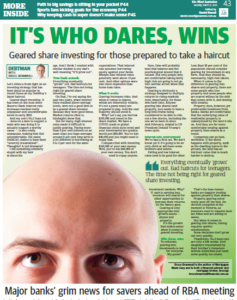
Bruce Brammall, The West Australian, 31 March 2025 Let’s shine a fresh light on an investing strategy that has been about as popular in recent times as my DebtBoy’s latest haircut. Geared […]
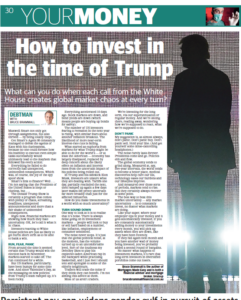
Bruce Brammall, The West Australian, 3 March 2025 Maxwell Smart not only got through assignments, but thrived, by being totally inept. Get Smart’s Agent 86 constantly managed to defeat the agents of Kaos with his cluelessness, because no-one could foresee how his inability to execute even simple tasks successfully would ultimately lead to the mayhem […]
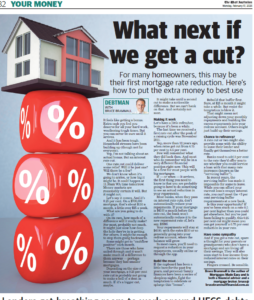
Bruce Brammall, The West Australian, 17 February 2025 It feels like getting a bonus. Extra cash you feel you deserve for all your hard work, weathering tough times. But you can never be sure until it arrives. And it has been tough. Household stresses have been building up (though not for everyone). Yep, I’m not […]
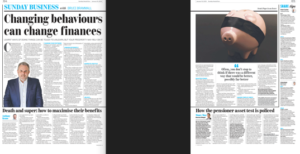
Bruce Brammall, The Australian, 19 January, 2025 Changing behaviours can be bloody hard. Particularly those ones that were almost bred in through your genes. Most of the time, it’s not actually genetic, but what you’ve picked up through your childhood and early adulthood, in what is referred to as “learned behaviour”. Early on in life, […]

Bruce Brammall, The Australian, 12 January, 2025 Anyone who has spent time in a big Asian city will understand how utterly crazy-chaotic the traffic can be. You look at the hundreds of motorbikes and cars passing you each minute and it seems just incomprehensible that people aren’t dying right in front of your eyes. If […]
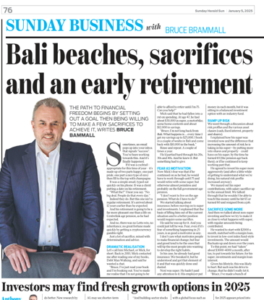
Bruce Brammall, The Australian, 6 January, 2025 Sometimes, an email pops up into your inbox that signals “success”. You’ve been working towards this. And it’s finally happened. If it was a cocktail – appropriate for this time of year – it’s made up of two parts happy, one part pride, one part a nice type […]
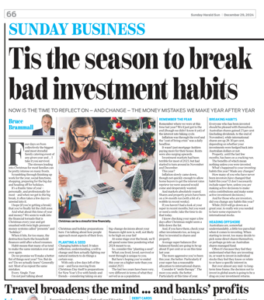
Bruce Brammall, The Australian, 29 December, 2024 Four days on from collectively the biggest and most stressful family catering event of any given year and … I take it you survived. The stresses leading into Christmas for most families can be pretty intense on many fronts. Scrambling through finishing up work for the year, social […]

Debt Man column – The West Australian (Money) For: 18 November, 2024. Debt Man Jeez, it’s hard to get a beer in Qatar. But I found myself one in an Irish sports bar in Doha. Where I met an interesting guy. Faced with two dozen screens showing sports I mostly wasn’t interested in, I settled […]
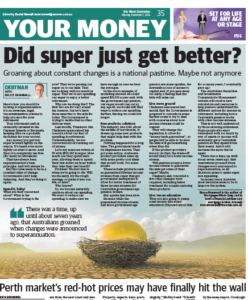
Bruce Brammall, The West Australian, 2 December 2024 Here’s how you should be looking at superannuation: It’s an awesome, legal, tax-minimisation scheme to help you save for your retirement. Your retirement cash ostensibly invested in the Cayman Islands or Bermuda, keeping dibs on a poolside deck chair for your arrival. Any money you put into […]
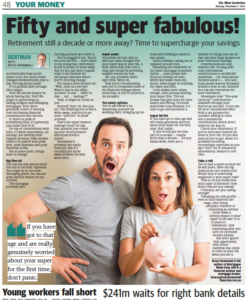
Bruce Brammall, The West Australian, 4 November 2024 As frantically busy as life seems to be, not much really changes fundamentally, day to day. Not big picture stuff. It’s a gradual shift through life’s stages. Your 20s should largely be about having fun. Your 30s might be partnering up, having midgets and managing mortgages. Your […]
© Bruce Brammall Financial 2009 -2025
Bruce Brammall Financial Pty Ltd as trustee for the Castellan Financial Consulting Unit Trust is an authorised representative of Sentry Advice Pty Ltd (AFSL number 227748). Bruce Brammall Financial Pty Ltd as trustee for the Castellan Financial Consulting Unit Trust is not authorised to provide credit services. All credit and mortgage services referred to on this website are provided by Bruce Brammall Lending Pty Ltd (ACL number 448881). The information contained within the website is of a general nature only. Whilst every care has been taken to ensure the accuracy of the material, Bruce Brammall Financial will not bear responsibility or liability for any action taken by any person, persons or organisation on the purported basis of information contained herein. Without limiting the generality of the foregoing, no person, persons or organisation should invest monies or take action on reliance of the material contained herein but instead should satisfy themselves independently of the appropriateness of such action.